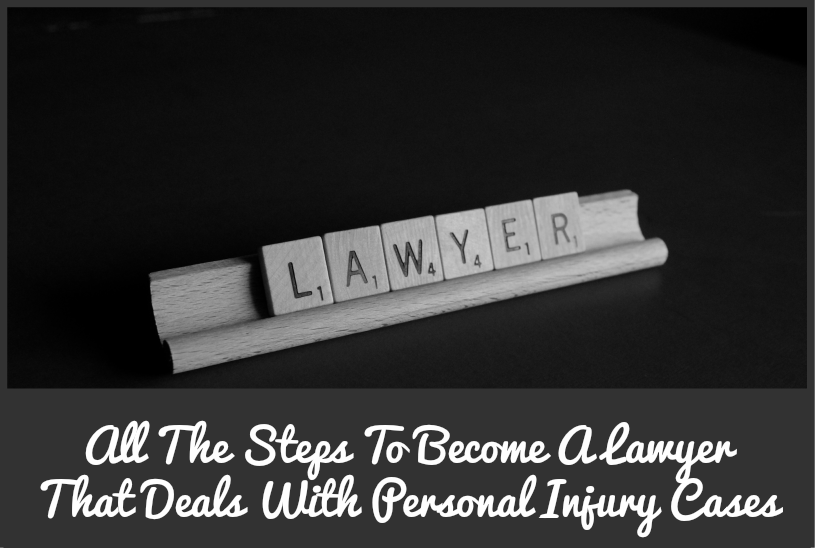
All The Steps To Become A Lawyer That Deals With Personal Injury Cases
Every year in the United States, over four million workers are injured on the job. Three million people sustain car accident injuries.
What’s more, these aren’t the only kinds of unintentional personal injuries affecting people. Dog bites, assault and battery, and medical malpractice cases are also common.
Personal injury lawyers play a vital role in ensuring the victims of injuries resulting from the negligence or mistakes of other people get the justice they deserve. You may click here to learn how professionals work in that scenario.
So, are you interested in joining this profession?
Continue reading to learn more about the steps to become a lawyer who deals with personal injury cases.
Understand the Job Description of a Personal Injury Lawyer
Why do you want to become a personal injury lawyer?
Maybe you’re passionate about helping other people, or your parents/career counselor are telling you that this is the right profession you. Or you simply want to become an injury lawyer because your closest friend wants to pursue the same career.
Regardless of your specific motivation, it’s important to have a clear picture of the job of a personal injury lawyer before making up your mind. It’s possible to have a change of heart once you know the job duties or work environment of injury lawyers.
What does a personal injury lawyer do?
- Offering legal advice to victims of personal injuries and their families
- Investigating claims and gathering evidence
- Filing legal complaints in court
- Formulating legal theories and researching on relevant laws
- Representing clients when cases go to trial
- Negotiating with insurance companies on settlement amounts
- Defending individuals and organizations that have been accused of negligence by personal injury victims
Since there are several types of personal injury cases, personal injury lawyers typically specialize in certain fields.
- For example, you could choose to become an auto accident lawyer, dealing exclusively with victims of car crashes.
- Or you could become a medical malpractice lawyer, focusing solely on people who suffer injuries at the hands of negligent doctors.
Regardless of your specialization, though, personal injuries lawyers, like most litigators, spend a good chunk of their time in their offices consulting with clients and offering legal advice. The rest of their time is spent in courts.
Looks like a career you can enjoy? If yes, here’s what to do next.
Obtain a Bachelor’s Degree
If you’ve just graduated from high school, you might be thinking all you need to become a personal injury lawyer is to join a law school and graduate.
How mistaken!
The journey to becoming a lawyer begins in undergraduate school, where you must earn a bachelor’s degree. There’s no specific discipline aspiring lawyers are required to study, but it’s advisable to pursue a program that’ll give you a relevant foundation. Some of the best pre-law majors include:
- Criminal justice
- Sociology
- Liberal studies
- Political science
- History
- Economics
- Psychology
- Philosophy.
After graduating with a bachelor’s degree, you’re ready to proceed to the next step:
Pass the Law School Admission Test (LSAT)
Anyone who wants to become a lawyer must pass the LSAT. This is a two-part, standardized test administered six times at designated centers across the United States and overseas.
The LSAT tests your persuasive writing skills, logical reasoning, critical reading, and analytical thinking abilities, all of which are fundamental to your competence as a law school student and future lawyer.
Bear in mind passing your LSAT doesn’t necessarily mean you’ll secure a law school admission.
Minimum entry scores vary from law school to law school. Tier 1 law schools, such as Yale, Harvard, and Columbia typically require higher scores than tier 2 law schools.
As such, it’s important to identify the law schools you’d like to join before you take the LSAT. This way, you can work toward meeting at least the minimum scores for those schools.
Join Law School
Law school, at last. Congratulations!
This is where you put in most of the work involved in becoming a personal injury lawyer. You’ll take common law courses during your first year of study, after which you will have the opportunity to major in personal injury law.
You’ll take classes in areas such as:
- Evidence
- Trial advocacy
- Personal injury statute of limitations (Read this blog for more information on this)
- Personal injury litigation
- Insurance law
- Medical malpractice
- Advanced torts
As part of law program requirements, you’ll be required to complete an externship. Use this opportunity to find a position in an established law firm with a personal injury practice. Here, you’ll work under the supervision of experienced injury lawyers for a couple of months.
After meeting all the requirements, you’ll graduate with a Juris Doctor (J.D) degree.
Secure an Admission to the Bar
To practice as a lawyer in your state, you must be admitted to the State’s Bar. This involves passing a bar examination. You’ll then be issued with an occupational license.
Find Employment as a Personal Injury Lawyer
With a law license, your next task is to find a job and start practicing as a personal injury lawyer.
The vast majority of newly-licensed lawyers start out by looking for employment in established law firms. This could be small firms serving a small town or area, or large firms with a state-wide or even national presence.
Alternatively, you can start your own small law firm. You learned about the business of running a law firm in law school, so getting started shouldn’t be a big challenge. Just ensure you have adequate startup capital.
Follow These Steps to Become a Lawyer Who Deals with Personal Injury Cases
Pursuing a career as a personal injury lawyer can be richly rewarding. You get to help people while earning a competitive salary. Now that you know the steps to become a lawyer, the path to your dream career is now clearer.
All the best and keep reading our blog for more career and workplace tips.
© New To HR


